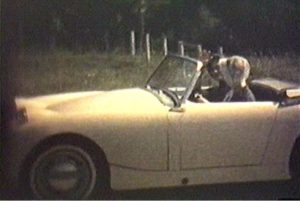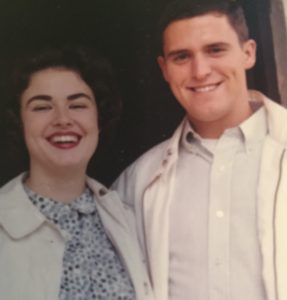I saw the woman an instant before I hit her, and then she came up, over the hood of my car, and smashed into the windshield, leaving strands of her hair embedded in the broken glass.
It was a chilly Saturday afternoon a few days before Christmas, dusk dark. I had been at work, at The News & Observer, and had stopped by a relative’s home to visit for a few minutes, before heading home. She had walked from the mobile home park where she lived to a convenience store on the other side of U.S. 64, a heavily traveled, four-lane highway with a grassy median. Now she was running back across the east bound lanes, going home, with a 12-pack of beer in her arms.
When I saw her I swerved to the right, trying to miss her, and rode my brakes to a stop at the edge of a ditch beside the highway. I may have hit her even before I swerved, before my car began sliding, leaving a long, black patch of rubber on the highway. Just as my car stopped, she fell off the hood and laid still at the edge of the highway.
I got out and yelled at a man coming toward us from a car lot on the other side of the ditch, yelled at him to call 911. He turn around and start running toward the office.
I took off my coat and laid it on her body and stood beside her until help began arriving, so other drivers could see that something was wrong — so she wouldn’t get hit again.
I didn’t know if she was alive or dead.
* * *
In a few minutes there were blue lights flashing all around. The troopers arrived first, then the ambulance.
Cars were stopping, parking. A crowd began to gather. One woman walked up to me and said, “I’m a nurse. Are you OK?” I said I was and she bent down over the woman laying at my feet. A few minutes later paramedics lifted her onto a stretcher, put her in an ambulance, and took off, back toward Raleigh, toward the Emergency Room at Wake Medical Center.
Another woman walked by without speaking to me but I heard her say to a trooper, “I was behind him. I saw the accident. That man did everything he could to avoid her.”
I guess I should have been grateful. Or relieved. Or something. But I wasn’t, I was numb.
Finally a trooper told me to get in his cruiser. He asked me what happened, and told me to start when I left my house that morning. And when I finished he didn’t ask any questions, he just said, “Now tell me again.”
The trooper who measured my skid marks estimated my speed at 45 to 50 miles per hour. The speed limit was 55. It was dusk dark, the time of day when some drivers have turned on their lights, and some haven’t. My lights were on. I had swerved trying to missed her and had slid to a stop. I didn’t think I would be charged, but who knows.
The trooper who told me to get in his patrol car asked me if I had been wearing my seat belt and I said “No, sir,” and he wrote me a ticket for that. I didn’t think he should have used my honor against me but I wasn’t in a position to argue about it.
And then he was finished and I got out of his patrol car. My car had been towed, so I started walking down U.S. 64 toward home, a two, three-mile hike. I hadn’t walked far when the trooper who had questioned me pulled up beside me, rolled down the passenger side window, asked where I was going and if I wanted a ride. I got back in his cruiser. On the way home he said, “I’m not going to charge you even if she dies.”
***
That night I called Brother Dave , who lives in Charlotte, and told him what had happened. He asked if I was going to the funeral if she died and offered to go with me. I said I wouldn’t go. But I was going to go to the hospital, to Wake Medical Center, on Sunday to see her family, tell them I was sorry, and try to answer any questions they had. He called me back and offered to go there, too.
Donna drove me over to the hospital the next day. I asked her to stay in the car. There were 10 or 12 of her relatives and friends in the waiting room, including her mother and father. I introduced myself and told them I was the man who had hit their daughter.
I told them I was sorry she had been hurt, that I had tried to miss her. I offered to answer their questions. Her family and friends were as kind to me as I tried to be to them.
But her mother asked me a question that I’ve thought about from time to time because it told me so much.
“Do you have a job?” she asked.
Postscript: The State Highway Patrol told me later that the woman I hit, who was mentally handicapped, had a blood alcohol content of .19, more than double the legal limit in North Carolina.
She survived the accident.
Coming Friday: “Against All Enemies…”

